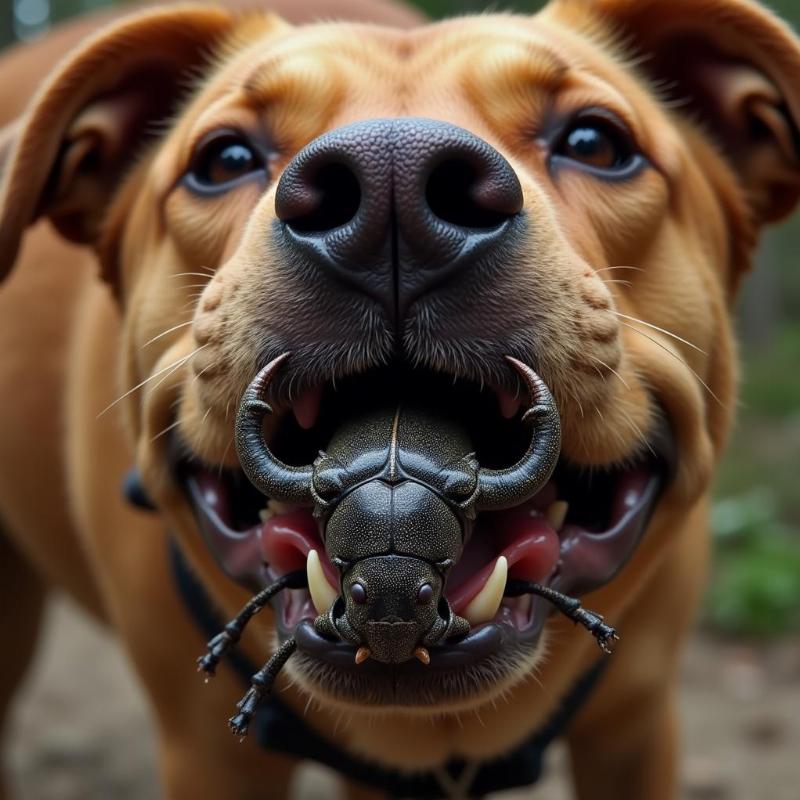Rhino beetles, with their impressive horns and hefty size, can be fascinating creatures. But what happens when your curious canine encounters one of these tiny titans? Are rhino beetles dangerous to dogs? Generally, rhino beetles pose little threat to dogs. However, there are a few nuances to consider when it comes to this six-legged encounter.
Understanding the Rhino Beetle
Rhino beetles are a diverse group of insects belonging to the Scarabaeidae family. Known for their unique horn-like structures, these beetles vary in size and color depending on the species. While their appearance might seem intimidating, they are primarily herbivores, feeding on fruits, nectar, and tree sap. They’re not aggressive by nature and typically only use their horns for defense against other beetles or predators.
The Potential Risks of Rhino Beetle Encounters
While rhino beetles aren’t inherently venomous or poisonous to dogs, a few potential concerns exist. The primary risk lies in the beetle’s hard exoskeleton and sharp horns. If a dog tries to eat a rhino beetle, the exoskeleton could irritate the mouth, throat, or digestive tract, potentially causing vomiting or diarrhea.
 Dog Chewing Rhino Beetle
Dog Chewing Rhino Beetle
Another consideration is the beetle’s defense mechanism. While rare, a rhino beetle might pinch a dog’s mouth or nose with its horns if it feels threatened. This could cause discomfort or a minor injury, although it’s unlikely to be serious.
What to Do if Your Dog Eats a Rhino Beetle
If your dog ingests a rhino beetle, monitor them for any signs of distress, such as vomiting, diarrhea, loss of appetite, or excessive drooling. If these symptoms persist or worsen, contact your veterinarian. In most cases, the beetle will pass through the digestive system without issue.
Preventing Rhino Beetle Encounters
The best way to avoid potential issues is to prevent your dog from interacting with rhino beetles in the first place. While completely eliminating the possibility is difficult, especially in areas where these beetles are common, you can take some precautions. Supervise your dog closely when they are outdoors, particularly in areas with vegetation where rhino beetles are likely to be found. Training your dog to “leave it” can also be helpful in redirecting their attention away from these insects.
Are Rhino Beetles Poisonous to Dogs if Ingested?
No, rhino beetles are not poisonous to dogs if ingested. While the exoskeleton might cause some gastrointestinal upset, they do not contain toxins that would harm a dog.
Conclusion
In conclusion, while rhino beetles are not typically dangerous to dogs, it’s best to prevent interactions to avoid potential discomfort or minor injuries. By being mindful of your dog’s surroundings and training them appropriately, you can ensure a safe and enjoyable outdoor experience for both of you.
FAQ
- What should I do if my dog vomits after eating a rhino beetle? Monitor your dog closely for any other signs of distress. If the vomiting continues or is accompanied by other symptoms, consult your veterinarian.
- Can rhino beetles transmit diseases to dogs? Rhino beetles are not known to transmit diseases to dogs.
- Are all species of rhino beetles safe for dogs? Generally, yes. However, the size of the beetle and the dog can influence the potential risk. A large beetle ingested by a small dog could cause more significant digestive upset.
- Do rhino beetles bite? While they have strong mandibles for chewing vegetation, they are unlikely to bite a dog.
- How can I keep rhino beetles out of my yard? Removing decaying wood and overripe fruit can help reduce the beetle population in your yard.
Beautdogs.us is your premier destination for comprehensive dog care information, breed expertise, and product recommendations. Catering to both new and experienced dog owners, Beautdogs.us offers a wealth of resources to empower you in providing the best care for your canine companion. From understanding potential hazards like rhino beetles to navigating the nuances of different breeds, we’re here to support your journey as a responsible pet parent. Contact us today for personalized advice and discover the perfect products for your furry friend. Email: [email protected], Phone: +1 501-555-7529.